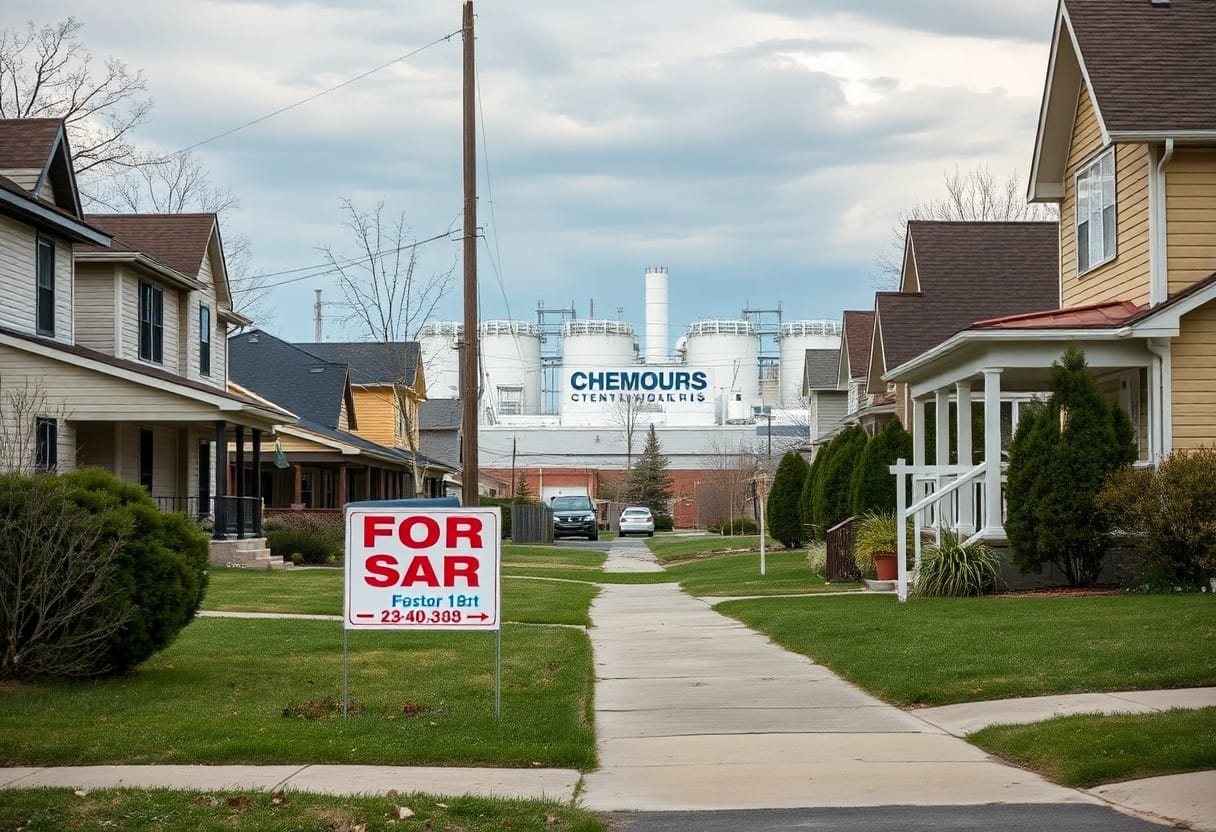It’s important to understand that Fayetteville is grappling with a serious health crisis linked to Chemours and toxic chemicals. These hazardous substances pose significant risks, affecting your health and wellbeing as they permeate the environment. Recent reports highlight the troubling impact of these chemicals, with the UN saying DuPont and Chemours violated human rights in the region, shedding light on the urgent need for accountability and action. Your awareness is the first step toward addressing this overlooked crisis and advocating for a safer community.

The Chemours Company: Background and Operations
While Chemours has established itself as a significant player in the chemical manufacturing sector, its operations have also raised concerns regarding environmental health. Founded in 2015 as a spinoff from DuPont, Chemours specializes in producing industrial chemicals, including fluoropolymers and chemicals for the automotive and construction industries. Your understanding of the complexities of its operations may shed light on the implications for Fayetteville’s safety and health.
Overview of Chemours
Any discussion of Chemours begins with its commitment to innovation and sustainability in chemical manufacturing. The company aims to deliver advanced materials while facing scrutiny over the safety of its products and practices. It’s necessary for you to explore how these ambitions align with environmental impact and community well-being.
Historical Context of Chemical Production
The legacy of chemical production in Fayetteville is deeply intertwined with the presence of Chemours, impacting both local industries and the environment. Chemours has roots in a long history of industrial chemical manufacturing, originally evolving from DuPont’s extensive operations. You may find it alarming that historical practices, while fostering economic growth, have also resulted in the contamination of land and water resources, contributing to Fayetteville’s current hidden health crisis.
This history has set a troubling stage where the expansion of chemical production often prioritized profits over safety. It can be concerning to learn that emissions from past production methods have led to the release of toxic substances into local ecosystems, ultimately affecting community health. As you investigate deeper into the ramifications of these practices, understanding how they contribute to current health crises becomes vital in addressing Fayetteville’s pressing issues.
Assessment of Toxic Chemicals
There’s a pressing need to evaluate the presence and impact of toxic chemicals in Fayetteville, particularly due to the activities at Chemours. By thoroughly assessing these substances, we can better understand their effects on public health and the environment.
Types of Chemicals Involved
There’s a wide array of toxic chemicals that are of particular concern to communities surrounding Chemours:
- Perfluoroalkyl substances (PFAS)
- Lead
- Arsenic
- Mercury
- Volatile Organic Compounds (VOCs)
Knowing the types of chemicals involved is vital for assessing their potential risks to you and your community.
| Chemical | Health Risks |
| PFAS | Immune system interference |
| Lead | Neurological damage |
| Arsenic | Cancer risk |
| Mercury | Developmental issues |
| VOCs | Respiratory problems |
Environmental Impact Studies
An increasing body of evidence underscores the dire environmental implications stemming from toxic chemical exposure in Fayetteville. Environmental impact studies play a pivotal role in documenting these effects, evaluating air, soil, and water quality in various areas affected by Chemours. This research helps in understanding the long-term consequences for local ecosystems and residents.
A continuing assessment of these environmental studies reveals that exposure to these toxic substances has led to decreased biodiversity and heightened health issues within the local community. Furthermore, pollutants have encroached into water sources, presenting serious challenges to your health and safety. Communities need to actively engage and advocate for transparency and remediation to protect your environment and health.
Health Implications for the Community
Some of the significant health implications stemming from chemical exposure in Fayetteville include increased rates of respiratory illnesses, developmental disorders, and various forms of cancer. The pervasive contamination from Chemours has alarmed residents, as toxic chemicals infiltrate air, water, and soil, leading to detrimental effects on public health. Community members must remain vigilant about the potential long-term consequences on their well-being.
Documented Health Issues
At this point, numerous studies have documented an alarming rise in health issues linked to chemical exposure in Fayetteville. Instances of asthma, developmental delays, and other serious health conditions have surged, prompting further investigations into the links between these ailments and the toxic materials released by Chemours.
Vulnerable Populations
After assessing the community, it’s clear that vulnerable populations, including children, the elderly, and individuals with pre-existing health conditions, are particularly susceptible to the adverse effects of toxic chemical exposure. Your health and safety are of paramount importance, and recognizing the risks these groups face is vital for promoting community awareness.
Considering the situation in Fayetteville, children are especially affected due to their developing bodies and systems, making them more vulnerable to toxic chemicals. Furthermore, the elderly may already have existing health issues, which can be exacerbated by environmental pollutants. Individuals in low-income communities, with limited access to healthcare, are also at a higher risk as they may lack resources to cope with health challenges. It’s vital to advocate for these vulnerable populations to ensure their voices are heard and their health needs addressed.
Regulatory Oversight and Responses
Now, the regulatory landscape surrounding the Chemours facility in Fayetteville has come under intense scrutiny as community concerns over toxic chemicals have escalated. State and federal agencies are grappling with the necessary oversight to ensure that your health and safety are prioritized in light of the emissions and contamination issues linked to this chemical plant.
Government Agencies Involved
About various government agencies are now actively involved in addressing the health crisis affecting Fayetteville. The Environmental Protection Agency (EPA) and North Carolina’s Department of Environmental Quality (DEQ) have been tasked with monitoring air and water quality, enforcing regulations, and taking necessary actions to mitigate risks to residents like you.
Legislative Actions and Proposals
About local and state legislators have started to propose significant reforms aimed at increasing transparency and accountability for chemical manufacturers. These proposals focus on strengthening regulations, enhancing public awareness, and ensuring that communities are informed about potential hazards related to toxic emissions.
Understanding the legislative landscape reveals that lawmakers are working to introduce policies that address the root causes of pollution and enhance community protections. For example, proposals may include stricter permit requirements for chemical plants, establishing health monitoring programs for affected populations, and mandating comprehensive assessments of environmental impacts. By supporting such measures, you play a role in advocating for your community’s right to a safe environment.
Community Activism and Advocacy
After uncovering the dire situation surrounding toxic chemicals in Fayetteville, community members have rallied together to form powerful advocacy groups. They work tirelessly to raise awareness, mobilize resources, and press for better regulations and accountability from companies like Chemours. With a shared commitment to improving public health and environmental safety, these activists are dedicated to creating a cleaner, safer future for all residents.
Local Organizations and Their Efforts
Behind the scenes, various local organizations are leading the charge against chemical pollution. Groups like Clean Water Fayetteville and the Fayetteville Alliance for the Environment are coordinating community events and educational workshops, ensuring residents have the information they need to advocate for themselves. Your engagement in their initiatives can significantly amplify their impact in the community.
Case Studies of Successful Initiatives
Among the notable initiatives, several case studies stand out as exemplary contributions to community health and safety:
- Clean Water Fayetteville: Successfully lobbied for the testing of local water supplies, revealing high levels of PFAS contamination, prompting immediate action from local authorities.
- Fayetteville Alliance for the Environment: Organized a series of community forums resulting in over 1,500 signatures on petitions aimed at demanding stricter regulations on chemical emissions.
- Health and Wellness Coalition: Provided over 300 families with free health screenings to address the impacts of chemical exposure, leading to increased support for affected individuals.
With these case studies, you can see the tangible differences made through local activism. Organizations have worked tirelessly to expose the dangers of toxic chemical exposure and have successfully influenced policy changes that enhance community health. These efforts have not only raised awareness but have also fostered a sense of agency among residents, empowering you to actively participate in advocating for your health and environment.
Future Outlook and Recommendations
Unlike previous decades, the awareness surrounding chemical pollution in Fayetteville is growing. You can engage with local advocacy groups and demand greater accountability from corporations like Chemours. It is vital to push for stricter regulations and transparency regarding chemical substances used and released into your environment, promoting a healthier future for your community.
Mitigation Strategies for Pollution
Behind the scenes, local authorities and community organizations are collaborating to implement effective mitigation strategies for pollution. You can support initiatives that focus on enhanced waste management practices, greener manufacturing technologies, and restoration of affected natural habitats. These strategies aim not only to reduce future pollution but also to improve the environmental health in your area.
Health Monitoring and Research Initiatives
Outlook on health monitoring and research initiatives is showing promise for Fayetteville residents. You can participate in community discussions that advocate for increased funding and support for scientific studies examining the long-term health impacts of exposure to toxic chemicals—like those released by Chemours—on your community’s well-being. This heightened focus on research aims to ensure that critical data is available to inform both policy decisions and public health measures.
Mitigation efforts are gaining traction, with ongoing collaborations between governmental and non-governmental organizations to promote research and identify the long-term effects of chemical exposure on Fayetteville residents. You can contribute to these efforts by encouraging local institutions to prioritize health monitoring programs focusing on vulnerable populations. Supporting thorough investigations into chemical impacts cultivates a community that is informed and proactive in safeguarding its health, ultimately driving policy changes that protect you and your loved ones.
To wrap up
Considering all points, it’s evident that Fayetteville’s hidden health crisis linked to Chemours and toxic chemicals deserves your attention. Understanding the implications of chemical exposure on your health and the environment is vital. As you explore the issue, take a moment to read about How Deregulation Fuels the Spread of Forever Chemicals, which sheds light on a broader context affecting communities like yours. Addressing these challenges can empower you to advocate for healthier environments and protect public health.


















